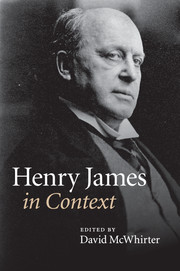Book contents
- Frontmatter
- Contents
- List of Illustrations
- Notes on Contributors
- Preface
- Abbreviations
- Chronology
- Part One Life and career, times and places
- Chapter 1 Nineteenth-century America (1843–1870)
- Chapter 2 Nineteenth-century Europe (1843–1900)
- Chapter 3 Victorian England (1870–1890)
- Chapter 4 Fin-de-siècle London (1890–1900)
- Chapter 5 The twentieth-century world (1901–1916)
- Chapter 6 Autobiographies and biographies
- Chapter 7 Letters and notebooks
- Chapter 8 The James family
- Part Two Historical and cultural contexts
- Part Three Reception
- Further reading
- Index
- References
Chapter 7 - Letters and notebooks
Published online by Cambridge University Press: 05 August 2014
- Frontmatter
- Contents
- List of Illustrations
- Notes on Contributors
- Preface
- Abbreviations
- Chronology
- Part One Life and career, times and places
- Chapter 1 Nineteenth-century America (1843–1870)
- Chapter 2 Nineteenth-century Europe (1843–1900)
- Chapter 3 Victorian England (1870–1890)
- Chapter 4 Fin-de-siècle London (1890–1900)
- Chapter 5 The twentieth-century world (1901–1916)
- Chapter 6 Autobiographies and biographies
- Chapter 7 Letters and notebooks
- Chapter 8 The James family
- Part Two Historical and cultural contexts
- Part Three Reception
- Further reading
- Index
- References
Summary
Henry James is famous for the sheer number of words he published, and in multiple forms – novels, stories, plays, essays, travel sketches, reviews, memoirs, autobiographies – so there is some curiosity, at least, in attending to the words he did not explicitly mean for print. In an age of publicity that was also the age of publication, he was aware of the likelihood that anything he did not actively take steps to destroy would one day see the light – and he had noted the effects of such exposure in cases from Hawthorne’s notebooks in 1872 to the letters of Flaubert and Stevenson in the 1890s. His resistance to the prospect was the rationale of the bonfires – of letters and other documents – whose smoke drifts across the trail of James studies to this day.
The two kinds of writing that are the focus of this chapter – James’s private notebooks and his private correspondence – do not, then, address a general public. They are nominally addressed to a single person, a single reader: in the first case, James himself and in the second, his correspondent. James harboured (justified) suspicions that some ‘publishing scoundrel’ (CS-3, 303) like Leon Edel would ransack his drawers and put their contents into print, and indeed Edel’s account of his thrill on coming across James’s journals in 1937, ‘in what looked like an old sea chest or footlocker sequestered in the basement of Harvard’s Widener Library’, recalls that of the narrator of ‘The Aspern Papers’. James had pre-imagined, we might say, Edel’s excitable frisson: ‘now I knew the sensations of the tomb-openers and the diggers in old cities’ (CN, x). But while he apparently consigned some documents to the flames – for, probably, a variety of reasons – he did not destroy the over ten thousand letters by him that survive (many of them still in the possession of their recipients, of course), nor (closer at hand) the items that make up The Notebooks of Henry James, edited by F. O. Matthiessen and Kenneth B. Murdock in 1947, or, four decades later, The Complete Notebooks of Henry James of 1987, edited by Leon Edel and Lyall H. Powers.
- Type
- Chapter
- Information
- Henry James in Context , pp. 68 - 79Publisher: Cambridge University PressPrint publication year: 2010

